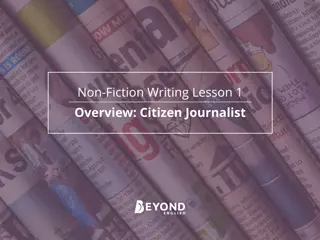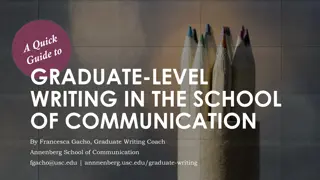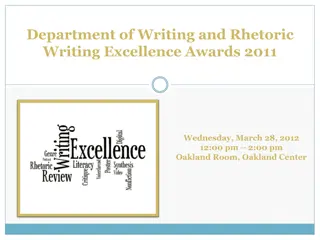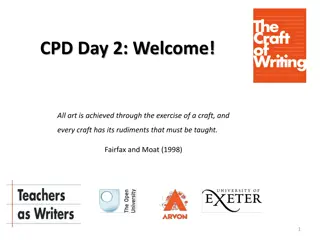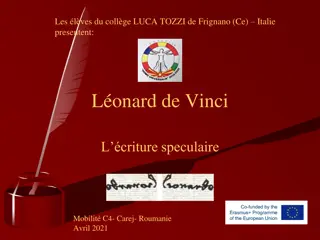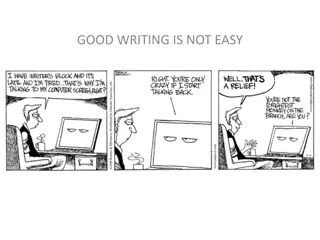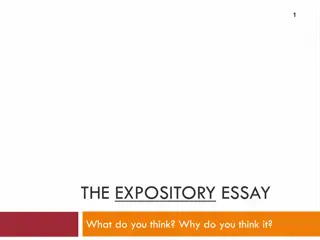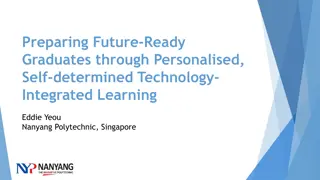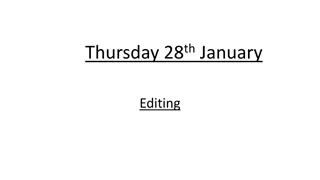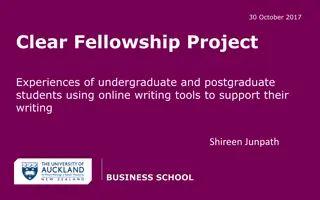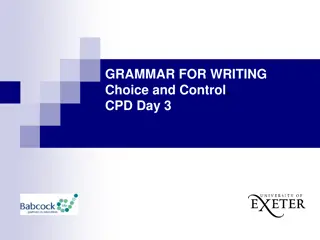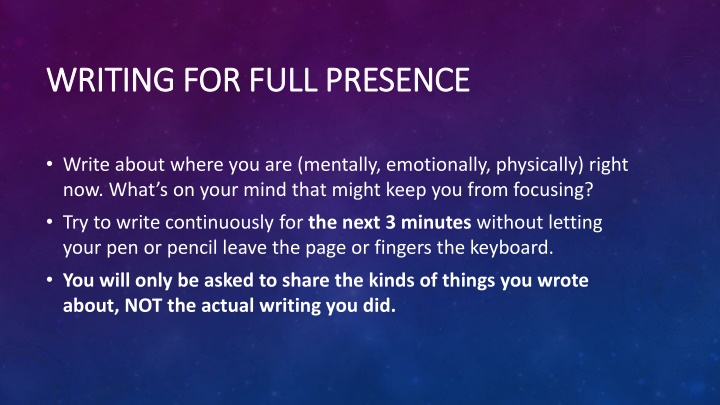
Writing for Full Presence: Empowering Student Engagement through Mindful Writing
Discover the impact of student-centered writing practices in fostering engagement and agency. Explore the benefits of mindfulness exercises in decoupling writing from assessment and empowering students with control over their writing process. Enhance the learning experience by embracing a medium that promotes curiosity and thoughtful contributions.
Download Presentation

Please find below an Image/Link to download the presentation.
The content on the website is provided AS IS for your information and personal use only. It may not be sold, licensed, or shared on other websites without obtaining consent from the author. If you encounter any issues during the download, it is possible that the publisher has removed the file from their server.
You are allowed to download the files provided on this website for personal or commercial use, subject to the condition that they are used lawfully. All files are the property of their respective owners.
The content on the website is provided AS IS for your information and personal use only. It may not be sold, licensed, or shared on other websites without obtaining consent from the author.
E N D
Presentation Transcript
WRITING FOR FULL PRESENCE WRITING FOR FULL PRESENCE Write about where you are (mentally, emotionally, physically) right now. What s on your mind that might keep you from focusing? Try to write continuously for the next 3 minutes without letting your pen or pencil leave the page or fingers the keyboard. You will only be asked to share the kinds of things you wrote about, NOT the actual writing you did.
USING STUDENT USING STUDENT- -DETERMINED WRITING TO FOSTER WRITING TO FOSTER DETERMINED ENGAGEMENT ENGAGEMENT BENJAMIN J. VILLARREAL, EDD BJVILLARREAL@NMHU.EDU
WRITING FOR FULL PRESENCE WRITING FOR FULL PRESENCE Share-Out (Aloud or In Chat) Effects What did it feel like to be given open space to write? Very low stakes writing Some student agency Did you enjoy it? Why or why not?
THE IMPORTANCE OF STUDENT THE IMPORTANCE OF STUDENT- - DETERMINED WRITING DETERMINED WRITING Mindfulness exercise Decouples writing from assessment Creates space for student agency over writing Shuts down the inner monitor (Flower & Hayes)
COMMENTARIES COMMENTARIES A place to prepare for class discussion (about a text) and to keep track of ideas to write about later
COMMENTARIES ( COMMENTARIES (BLAU STAKES/AGENCY STAKES/AGENCY BLAU) = MEDIUM ) = MEDIUM Protocol Effect 1. Write a contribution to a discussion of a literary work 1. Situates writing within larger discussion 2. Encourages curiosity over regurgitation 2. Begin with I wonder and continue with which makes me think 3. Genre analysis 3. In small groups, read commentaries aloud & take note of what commentaries DO, not what they re ABOUT 4. Agency over writing by privileging how they respond 4. Report back to class: these are now the features of class commentaries for the semester!
DO THIS NOW! DO THIS NOW! 1. Look at your writing for full presence 2. Skip the read aloud 3. Discuss what your writing for full presence DOES 4. Report back!
INVITATIONS TO CREATE INVITATIONS TO CREATE Invitations [that] speak to the recipient, enticing them to run with it and see where it leads; [that] open up and spark the creative process; [that] limber up thinking and lead us into meaningful conversations. (Blom)
INVITATIONS TO CREATE = HIGH INVITATIONS TO CREATE = HIGH STAKES/AGENCY STAKES/AGENCY Protocol Effects 1. 2. Begin with quote from text and context Follow with another quote from text or related text and context Offer an outside real world source (another quote, video clip, article, etc.) Ask students to consider all 3 side-by- side and to respond In whatever way seems best to you (poetry, prose, music, art, video, dance, etc.) 1. Including specific parts of multiple texts creates multiple entry points 2. Even students who haven t done the reading can participate 3. 3. Create greater sense of student ownership over concepts/texts, leading to greater understanding/engagement 4. 4. Creating space for different genres of composing creates space for students to determine the best way to express their learning
DISCUSS DISCUSS What are some ways of applying these to your own classes?
SHARED DOC FOR REFLECTION SHARED DOC FOR REFLECTION In a couple of weeks, come back to this doc after trying a strategy, and reflect on what you noticed, what the implications of that are, and what you d like to try next.
QUESTIONS, QUIBBLES, QUESTIONS, QUIBBLES, CONTROVERSIES? CONTROVERSIES? References/Resources: Blau, S. (2010). Academic writing as participation: Writing your way in. In P. Sullivan, H. Tinberg, & S. Blau (Eds.) What is College Level Writing? Volume 2: Assignments, Readings, and Student Writing Samples (pp. 29-56). NCTE. Blom. N. (2019, April 2). Crafting invitations to create. Center for the Professional Education of Teachers. https://cpet.tc.columbia.edu/news-press/crafting-invitations-to-create Center for the Professional Education of Teachers. (2021). Center for the Professional Education of Teachers. https://cpet.tc.columbia.edu/ Flower, L., & Hayes, J. (1981). A Cognitive theory process of writing. College Composition and Communication, 32(4), 365-387.

